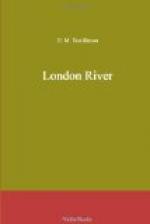Next door, in a small room to which day and night were the same, Mr. Pascoe was always to be found bending over his hobbing foot, under a tiny yellow fan of gaslight which could be heard making a tenuous shrilling whenever the bootmaker looked up, and ceased riveting. When his head was bent over his task only the crown of a red and matured cricketing cap, which nodded in time to his hammer, was presented to you. When he paused to speak, and glanced up, he showed a face that the gas jet, with the aid of many secluded years, had tinctured with its own artificial hue, a face puckered through a long frowning intent on old boots. He wore an apron that had ragged gaps in it. He was a frail and dingy little man, and might never have had a mother, but could have been born of that dusty workroom, to which he had been a faithful son all his life. It was a murky interior shut in from the day, a litter of petty tools and nameless rubbish on a ruinous bench, a disorder of dilapidated boots, that mean gas jet, a smell of leather; and there old Pascoe’s hammer defiantly and rapidly attacked its circumstances, driving home at times, and all unseen, more than those rivets. If he rose to rake over his bench for material or a tool, he went spryly, aided by a stick, but at every step his body heeled over because one leg was shorter than the other. Having found what he wanted he would wheel round, with a strange agility that was apparently a consequence of his deformity, continuing his discourse, and driving his points into the air with his hammer, and so hobble back, still talking; still talking through his funny cap, as his neighbours used to say of him. At times he convoluted aerial designs and free ideas with his hammer, spending it aloft on matters superior to boots. The boots were never noticed. Pascoe could revivify his dust. The glitter of his spectacles when he looked up might have been the sparkling of an ardent vitality suppressed in his little body.




